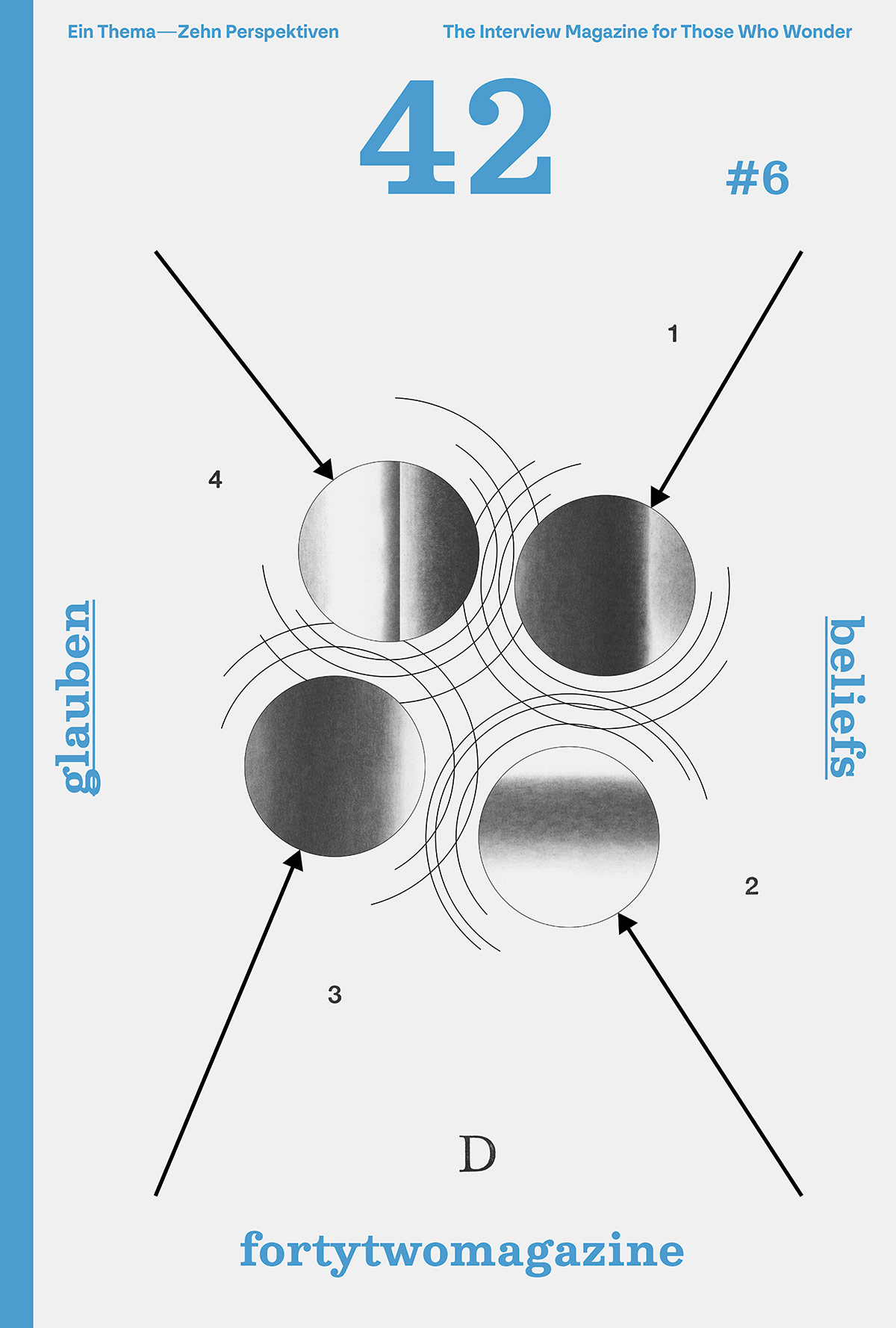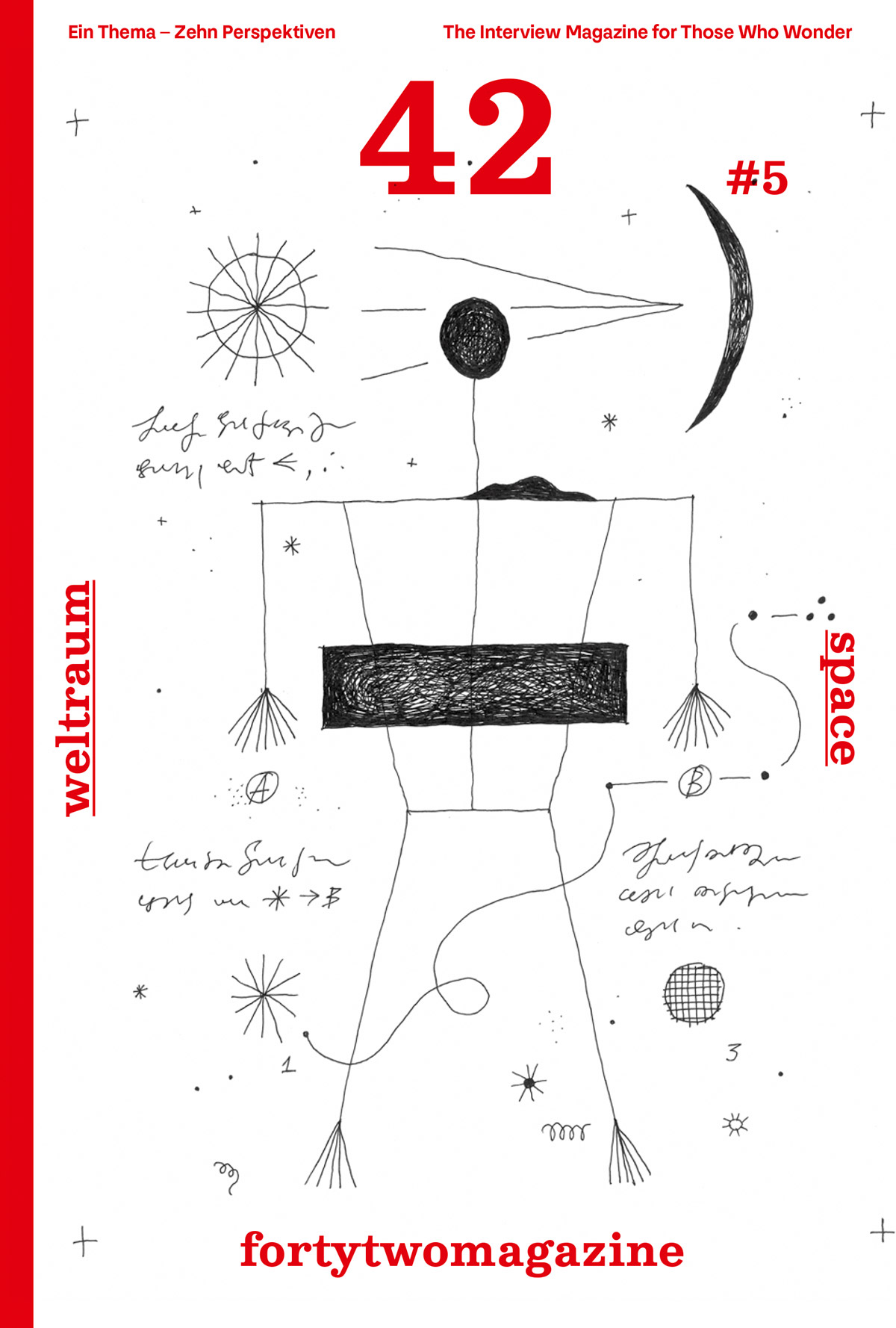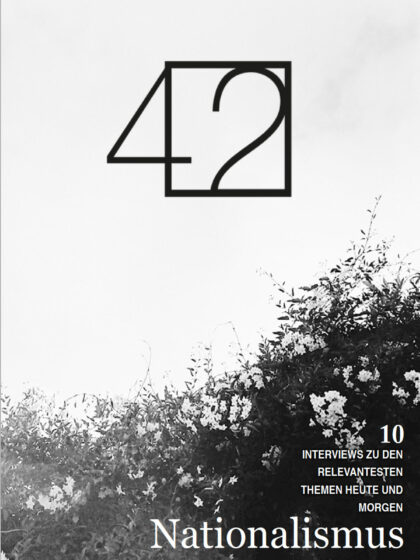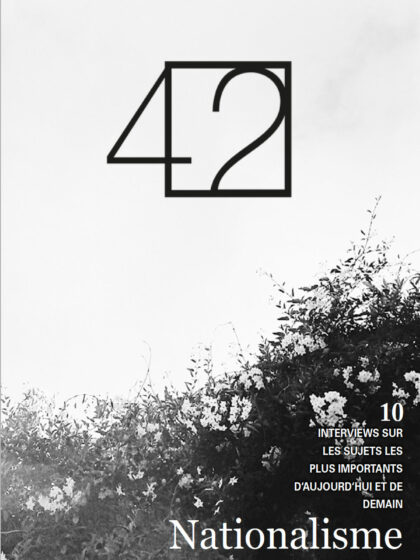#6–beliefs

Get the bilingual print issue for 18.00€ /
Hol Dir das zweisprachige Magazin für 18,00€
beliefs
Did you know that our beliefs have the power to influence how we perceive pain and that we believe different things depending on whether we are speaking our native language or a foreign language?
Have you ever wondered why rational arguments often fail to convince conspiracy ideologues or considered how the popular phrase “just believe in yourself” masks structural inequality?
This 6th issue of fortytwomagazine invites you to explore the realm of beliefs through ten thought-provoking interviews in both German and English with distinguished scientists, who shed light on the topic from their distinct perspectives such as social psychology, religion, and artificial intelligence.
glauben
Wusstest du, dass unsere Überzeugungen Einfluss darauf haben, wie wir Schmerzen wahrnehmen, und dass wir unterschiedliche Dinge glauben, je nachdem, ob wir unsere Muttersprache oder eine Fremdsprache sprechen?
Hast du dich schon einmal gefragt, warum rationale Argumente Verschwörungsideologen oft nicht überzeugen können, oder darüber nachgedacht, dass sich hinter der beliebten Phrase “Glaube einfach an dich selbst” strukturelle Ungleichheit verbirgt?
Die 6. Ausgabe von fortytwomagazine lädt dich dazu ein, das Reich der Überzeugungen anhand von zehn anregenden Interviews mit renommierten Wissenschaftler:innen in deutscher und englischer Sprache zu erkunden, die das Thema aus ihren unterschiedlichen Blickwinkeln wie Sozialpsychologie, Religion und künstliche Intelligenz beleuchten.
#5–space

Get the bilingual print issue for 14.00€ / 10.00€
Hol Dir das zweisprachige Magazin für 14.00€ / 10.00€
EN
space
Where does the universe begin, where does it end? Imagining such dimensions is no easy exercise. Against all odds, we go to great lengths to do so in this issue: The universe not only offers room for speculation about outer space or romantic reveries while looking up at the starry sky. Even if it feels far away, it has a direct influence on our lives. We take a look at how much space is part of our everyday routines, for example when we are comfortably sitting on the sofa watching a live soccer match thanks to satellites and analyse how the technology we depend on also changes our understanding of who we are. Moreover, we examine the complex relationship between politics and space activities and learn how space will change the wars of the future.
DE
Weltraum
Wo fängt das Universum an, wo hört es auf? Sich diese Dimensionen vorzustellen, ist keine leichte Übung. Trotzdem machen wir es in dieser Ausgabe, denn das Weltall bietet nicht nur Platz für Spekulationen über außerirdisches Leben oder romantische Träumereien beim Blick in den Sternenhimmel. Auch wenn es sich weit entfernt anfühlt, hat es direkten Einfluss auf unser Leben. Wir werfen einen Blick darauf, wie sehr das Weltall Teil unserer alltäglichen Routinen ist, zum Beispiel, wenn wir dank Satelliten die Live-Übertragung eines Fußballspiels gemütlich auf dem Sofa gucken. Außerdem analysieren wir inwiefern die Technologie, von der wir abhängig sind, auch unser Verständnis davon verändert, wer wir sind. Auch die komplexe Beziehung zwischen Politik und Weltraumaktivitäten nehmen wir unter die Lupe und wir erfahren, wie der Weltraum die Kriege der Zukunft verändern wird.
#4–changing climate

EN
Changing Climate
Who can and should do something about climate change is a very complex question. What happens if our efforts fall short and climate change progresses faster than we can fight it? While many experts are researching how we can stop climate change, others are trying to influence the environment to decelerate it. Both approaches and 10 perspectives on what is probably the most urgent challenge facing society today can be read in our fourth issue.
Get the ePaper for 10.00€

DE
Klima im Wandel
Wir verbrauchen unsere Ressourcen zu schnell, das Klima kippt. Die Frage, wer etwas gegen den Klimawandel tun kann und sollte, ist komplex. Was passiert, wenn die Bemühungen nicht reichen und der Klimawandel schneller voranschreitet, als er bekämpft wird? Während viele Expert:innen daran forschen, wie wir den Klimawandel aufhalten können, versuchen andere, auf die Umwelt einzuwirken, um ihn zu verlangsamen. Beide Wege und insgesamt 10 Perspektiven auf das wohl drängendste Thema unserer Zeit sind in Ausgabe 4 zu lesen.
Hol Dir das ePaper für 10,00€

FR
Le tournant climatique
Dans les faits, nous consommons les ressources de la planète trop rapidement et le climat bascule en conséquence. “Qui peut et qui devrait faire quelque chose contre le changement climatique ?” Cette question est complexe. Que se passera-t-il si nos efforts ne suffisent pas, si le changement climatique progresse plus vite qu’il n’est combattu ? Alors que de nombreux experts cherchent à savoir comment arrêter le changement climatique, d’autres tentent d’influencer l’environnement pour le ralentir. Les deux pistes et un total de 10 perspectives sur ce qui est probablement la question la plus urgente de notre temps peuvent être lues dans le numéro 4.
Obtenez le ePaper pour 10,00€
#3–digital transformation

EN
Digital Transformation
In this issue, we explore the complex relationship between man and machine as well as artificial intelligence in detail. What impact does the digital transformation have on society? Does the Internet liberalise societies, for example when people from different socio-economic backgrounds meet at Tinder Dates? And should someone be in charge to filter the information overflow?
Get the ePaper for 10.00€

DE
Digitalisierung
In dieser Ausgabe gehen wir dem Zusammenspiel von Mensch und Maschine sowie künstlichen Intelligenzen ganz genau auf den Grund und fragen: Welche Auswirkungen hat die Digitalisierung auf unsere Gesellschaft? Liberalisiert das Internet unsere Gesellschaften vielleicht sogar, zum Beispiel, wenn Menschen aus verschiedenen sozioökonomischen Hintergründen bei Tinder-Dates zusammentreffen? Und braucht es jemanden, der die Informationsflut im Netz filtert?
Hol Dir das ePaper für 10,00€

FR
Passage au numérique
Dans ce numéro, nous examinons la manière dont l’homme et la machine interagissent ainsi que le rôle de l’intelligence artificielle. Et nous demandons : Quels sont les effets de la numérisation sur notre société ? Est-ce qu’Internet libéralise peut-être même nos sociétés, par exemple lorsque des personnes de différents milieux socio-économiques se rencontrent à Tinder Dates ? Et faut-il un débat afin de déterminer l’instance qui devrait prendre en charge la filtration de cette abondance d’informations ?
Obtenez le ePaper pour 10,00€
#2–nationalism

EN
Nationalism
Freedom and life without borders had been regarded as self-evident in Europe over centuries. Passports, as we know them today, were not introduced until 1920 and should have been abolished later. Today, we feel that national borders are just as normal as the fact that some people need a visa to travel to other countries, and others do not.
In this issue, we take a close look at how national pride affects our mental health and what happens when the concept of “nation” is glorified and misused as an argument for isolation. Besides that, we ask: What are alternative visions to the nation-state?
Get the ePaper for 10.00€

DE
Nationalismus
Jahrhundertelang war die gelebte Grenzenlosigkeit in Europa selbstverständlich. Reisepässe, wie wir sie heute kennen, wurden erst 1920 eingeführt und sollten eigentlich wieder abgeschafft werden. Heute empfinden wir Staatsgrenzen als ebenso normal wie die Tatsache, dass manche ein Visum brauchen, um in andere Länder zu reisen. In dieser Ausgabe schauen wir uns ganz genau an, wie zum Beispiel Nationalstolz unsere psychische Stabilität beeinflusst und was passiert, wenn das Konstrukt Nation verherrlicht und als Argument für Abschottung missbraucht wird. Außerdem fragen wir: Welche Alternativen gibt es zum Nationalstaat?
Hol Dir das ePaper für 10,00€

FR
Nationalisme
Pendant des années, la possibilité de voyager en Europe en traversant les frontières sans encombre semblait naturelle. Les passeports tels que nous les connaissons aujourd’hui ne furent introduits qu’en 1920 dans le but d’être supprimés quelques années après. Aujourd’hui, l’existence de frontières entre les Etats nous paraît tout aussi naturelle que la nécessité, pour certains, de posséder un visa afin de pouvoir voyager à l’étranger. Dans ce numéro, nous examinons, par exemple, comment l’identification sociale et la fierté nationale influent de manière positive sur la stabilité psychique et quand ce rapport devient problématique lorsque le concept de nation est glorifié et utilisé à mauvais escient en prenant pour seul motif celui de s’isoler des autres nations. En outre, nous demandons : Est-il possible de concevoir une alternative au modèle étatique?
Obtenez le ePaper pour 10,00€
#1–terrorism

EN
Terrorism
In this issue, we find out how terrorism functions: What language do journalists use to talk about terrorism? How do states counter terrorism? Is there really a separation between secular and religious terrorism? To find answers to these questions, we conducted interviews with ten experts from a wide range of disciplines: from the historian to the security researcher, from the Islamic Studies scholar to the psychologist.
Get the ePaper for 10.00€

DE
Terrorismus
Wir fragen nach, wie Terrorismus funktioniert: Welcher Sprache bedienen sich Journalisten, um über Terrorismus zu sprechen? Wie begegnen Staaten Terrorismus? Gibt es tatsächlich eine Trennung zwischen weltlichem und religiösem Terrorismus? Um Antworten auf diese Fragen zu finden, haben wir zehn Expert:innen unterschiedlichster Fachgebiete interviewt: vom Geschichtswissenschaftler bis zum Sicherheitsforscher, vom Islamwissenschaftler bis zum Psychologen.
Hol Dir das ePaper für 10,00€

FR
Terrorisme
Nous demandons comment fonctionne le terrorisme : Quelle langue utilisent les journalistes pour parler du terrorisme ? Comment les états l’affrontent-il ? Y-a-t-il vraiment une séparation entre le terrorime politique et religieux ? Pour trouver des réponses à ces questions, nous avons mené des entretiens avec dix experts : de l’historien au spécialiste en sécurité, de l’islamologue au psychologue.
Obtenez le ePaper pour 10,00€
